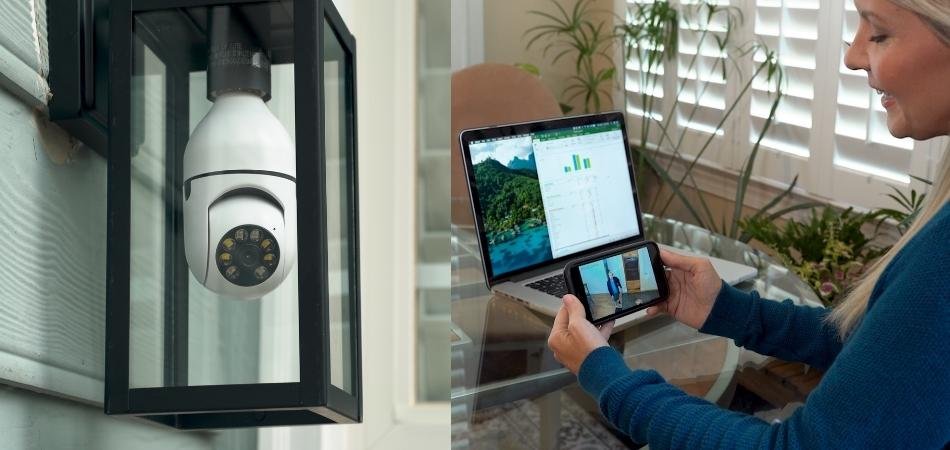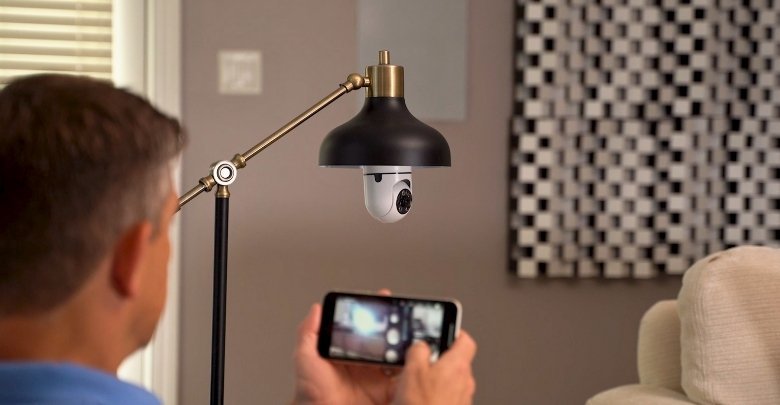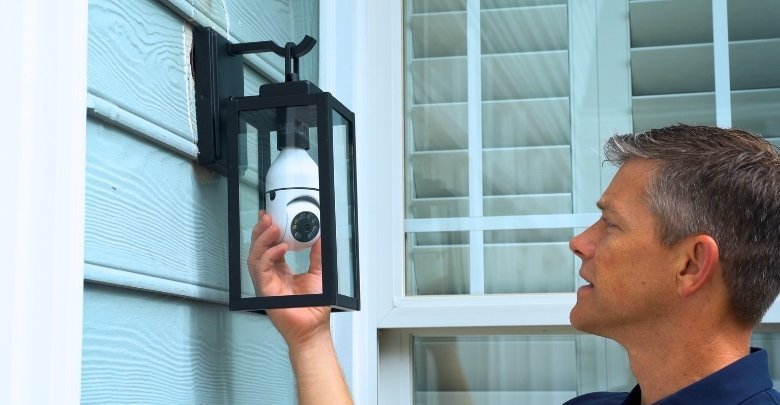A light bulb security camera is an innovative product that combines the convenience of a light bulb with the functionality of a security camera. They fit into standard light sockets and provide a discreet way to monitor a home or business. But are light bulb security cameras worth it?
Yes, light bulb security cameras are worth it if you’re seeking an easy-to-install, cost-effective security solution. These cameras offer remote monitoring and can be a great way to enhance your surveillance without the need for complicated setups. However, they may not offer the same advanced capabilities as traditional security systems.
Curious to learn more? Read on to learn whether light bulb security cameras are right for you.
Are Light Bulb Security Cameras Worth It?
Yes, light bulb security cameras are worth investing in. They offer a combination of convenience and functionality, making them an attractive option for many. If you’re considering them, let’s dive into the reasons why they might be a good fit.

Easy Installation and Setup
Installing light bulb security cameras is quick and easy compared to traditional systems. They screw into existing light sockets without additional wiring or drilling. This straightforward setup makes them ideal for renters or anyone seeking hassle-free installation. You can have a functional surveillance system up and running within minutes.
Cost-Effective Security Solution
Compared to traditional security cameras, light bulb cameras are generally more affordable. They offer a budget-friendly way to monitor your property without compromising quality. You don’t need to hire professionals or purchase expensive equipment for installation. The initial cost and maintenance are both budget-friendly.
Discreet Appearance
Light bulb security cameras can be an excellent choice if their features match your needs. Considering products like Sight Bulb, which offers a discreet appearance and functionality, can enhance your overall security experience. Understanding their strengths and weaknesses will help you make an informed decision. Choose wisely to ensure your property remains safe and well-monitored.
Remote Monitoring Convenience
Most light bulb security cameras allow you to monitor your property from anywhere via smartphone apps. This feature offers peace of mind whether you’re at work or traveling. Real-time alerts provide instant updates if suspicious activity is detected. You can review footage immediately, enhancing overall security.
Dual-Purpose Functionality
Light bulb security cameras provide both lighting and surveillance in a single unit. This dual-purpose approach saves space and improves practicality. It’s a smart choice for areas like porches, garages, or driveways. The added illumination can also act as a deterrent to potential intruders.
How Do Light Bulb Security Cameras Work?
Security cameras with light bulbs offer both lighting and surveillance. You can determine if they are suitable for your needs by understanding their functionality. Let’s break down how these clever gadgets work in a simple, user-friendly way:

Powering the Camera
Light bulb security cameras draw power directly from standard light sockets. Installing them is as simple as screwing in a regular bulb. Once connected, they receive constant power to operate. This straightforward setup eliminates the need for batteries or complex wiring.
Capturing Footage
These cameras use built-in lenses to capture video footage. Many models record in high-definition to ensure clear visuals. They continuously capture scenes or activate upon detecting motion. The recorded footage is then stored or transmitted to connected devices.
Storing Data
Captured footage is stored through various methods depending on the model. Some cameras save data to local SD cards for easy access. Others use cloud storage services, allowing remote viewing anytime. Storing data securely ensures you can retrieve important recordings when needed.
Connecting to Wi-Fi
Most light bulb cameras require Wi-Fi connectivity for remote monitoring. Once connected, footage can be accessed through a smartphone app. This feature allows users to monitor their property from anywhere. A stable internet connection is essential for uninterrupted operation.
Enabling Remote Monitoring
Smartphone apps offer convenient access to live video feeds. Users can receive alerts if motion is detected by the camera. Remote monitoring provides peace of mind even when away from home. This functionality makes light bulb cameras an appealing choice for many.
Providing Illumination
Apart from capturing footage, these devices also function as regular light bulbs. They provide illumination while maintaining their surveillance capabilities. This dual-purpose feature makes them practical and space-efficient. It’s an effective way to enhance security without adding clutter.
Light Bulb Security Cameras vs. Traditional Security Systems- How Do They Differ?
When choosing a security system for your home, it’s important to understand the differences between light bulb security cameras and traditional security systems. Each option offers distinct features and benefits. Below is a comparison table to help you decide which is best suited for your needs.
| Aspect | Light Bulb Security Cameras | Traditional Security Systems |
| Installation | Easy, DIY installation; fits into standard light sockets. | Professional installation often required with complex wiring. |
| Cost | Affordable, with most models priced below standard systems. | Typically expensive, especially with advanced features and professional setup. |
| Appearance | Discreet design, often resembling ordinary light bulbs. | Visible cameras and sensors, potentially deterring intruders. |
| Functionality | Combines lighting and surveillance in a single device. | Dedicated security features without additional functions. |
| Connectivity | Relies on Wi-Fi connectivity for remote monitoring. | May use wired, wireless, or hybrid connections. |
| Storage Options | Local storage or cloud-based, depending on the model. | Usually features cloud storage or dedicated servers. |
| Motion Detection | Often includes basic motion detection features. | Advanced motion detection with customizable alerts and zones. |
| Video Quality | Varies; typically HD but can be lower for cheaper models. | High-definition and ultra-high-definition options available. |
| Power Source | Draws power directly from light sockets. | Battery-operated, wired, or hybrid systems. |
| Maintenance | Minimal maintenance required; just occasional cleaning. | Requires regular upkeep, especially for wired systems. |
How Long Do Light Bulb Security Cameras Typically Last Before Replacement?
Light bulb security cameras generally last between one to three years, depending on their build quality and usage. Most models are designed to withstand regular use, but wear and tear can affect their performance. Factors like environmental conditions and maintenance play a crucial role. Choosing a durable model can help extend the camera’s lifespan significantly.

Usage patterns greatly impact how long these cameras last before needing replacement. If used constantly, the internal components may degrade faster. The energy consumption of bulb cameras also affects their longevity, as higher usage can strain components. Regular maintenance, such as cleaning and updating software, can help preserve their functionality.
Light bulb cameras used outdoors may face harsher conditions, leading to faster deterioration. Moisture, dust, and temperature changes can reduce their lifespan. Indoor cameras generally last longer due to more stable conditions. Investing in weather-resistant models can help protect outdoor cameras from environmental damage.
Limitations of Light Bulb Security Cameras
Investing in light bulb cameras offers convenience, but there are certain limitations to consider. Knowing their drawbacks helps you make a well-informed decision. Below are some common limitations you should be aware of:
- Limited Field of View: Most light bulb cameras have a fixed view, reducing coverage. Their positioning within a light socket restricts their viewing angle.
- Dependence on Wi-Fi Connectivity: Wi-Fi is essential for remote monitoring, but poor connectivity affects performance. Interruptions in Wi-Fi can result in missed footage.
- Lower Video Quality: Budget models often compromise on resolution, affecting clarity. Poor video quality can hinder identifying faces or crucial details effectively.
- Restricted Night Vision: Night vision capabilities may be limited, especially in lower-end models. This can compromise nighttime surveillance and overall security effectiveness.
- Vulnerability to Power Outages: Being connected to light sockets means they fail during power outages. No backup battery means complete loss of functionality during blackouts.
- Minimal Smart Home Integration: Compatibility with smart home systems is often limited. Lack of integration can make them less appealing for advanced smart homes.
- Inconsistent Motion Detection: Motion detection features may lack precision in differentiating between significant movements and false triggers. This can lead to frequent unnecessary alerts.
- Durability Issues: Continuous usage may affect longevity, especially for cheaper models. Environmental factors like heat, moisture, or dust can cause damage over time.
What Are the Common Concerns When Installing Light Bulb Security Cameras?
Installing light bulb security cameras may seem simple, but several concerns can affect their overall efficiency and durability. Addressing these issues before installation ensures a smoother experience and better performance. Here are some common concerns you should be aware of before setting up your device.
Compatibility with Existing Fixtures
Not all light bulb sockets are compatible with security cameras, causing installation issues. Some fixtures may not provide adequate support or power. Ensuring compatibility with your existing fixtures prevents unnecessary frustration and complications. Being familiar with the steps to install a smart bulb camera helps avoid compatibility problems.
Power Supply Issues
Light bulb cameras require continuous power to function properly. Interruptions from power outages can cause complete loss of surveillance capabilities. Without backup power sources, cameras fail to operate during blackouts. A stable and consistent power supply is necessary for reliable performance.
Wi-Fi Connectivity Problems
Effective operation of smart bulb cameras depends heavily on strong and consistent Wi-Fi connectivity. Weak signals can cause delays or missed recordings. Interference from other devices may further reduce connection quality. Keeping cameras within a reliable Wi-Fi range is essential for smooth monitoring.
Privacy Concerns
Using cameras in shared or private spaces can raise privacy issues among residents or guests. Misuse of footage can lead to legal challenges and disputes. Respecting privacy boundaries helps maintain healthy relationships and trust. Following privacy regulations ensures responsible use of surveillance technology.
Limited Night Vision Capabilities
Certain models offer limited night vision, making them less effective in low-light environments. Poor night vision can compromise nighttime security. Investing in models with reliable infrared or enhanced night vision features helps improve surveillance. Clear visibility during nighttime monitoring is essential for accurate footage.
Weather Resistance Limitations
Outdoor installations require cameras with weather-resistant features to handle various conditions. Light bulb cameras not designed for outdoor use can fail prematurely. Exposure to rain, heat, or dust can damage internal components. Checking for weatherproofing features ensures better durability and performance.
FAQ
In recent years, the popularity of light bulb security cameras has increased due to the unique combination of lighting and surveillance they provide. However, many users still have questions about their functionality, reliability, and practical use. Below are some frequently asked questions to help you better understand whether investing in light bulb security cameras is the right choice for you.
Can Light Bulb Security Cameras Be Hacked?
Yes, like any device connected to the internet, light bulb security cameras can be vulnerable to hacking. To reduce the risk, always use strong, unique passwords and keep the camera’s firmware up to date. Enabling two-factor authentication also adds an extra security layer.
How Can I Improve the Wi-Fi Signal for My Light Bulb Camera?
Improving Wi-Fi signal involves placing the router closer to the camera or using a Wi-Fi extender. Avoiding obstructions like walls and electronic interference can also help. Upgrading your router to a stronger model may further enhance connectivity.
Can Light Bulb Cameras Be Controlled with Voice Assistants?
Some models are compatible with voice assistants like Alexa or Google Assistant. This allows you to control camera functions using voice commands. Checking for compatibility before purchase ensures seamless integration with your smart home setup.
How Can I Maintain My Light Bulb Security Camera?
Regular maintenance includes cleaning the lens to prevent dust buildup and updating the firmware for improved security. Checking Wi-Fi connections and ensuring the light socket is in good condition are also essential. This helps maintain optimal performance.
Is the Light Always On When Using a Light Bulb Camera?
No, most light bulb security cameras can function without the light being on. You can control the lighting feature through the app. This flexibility makes them useful for day and night surveillance.
How Do I Know If My Light Bulb Camera Is Recording?
Most cameras have LED indicators or app notifications showing recording status. You can also check the live feed through the mobile app. Regularly reviewing footage ensures that the camera is functioning as expected.
Bottom Line
Security cameras with light bulbs represent a versatile and innovative solution for those seeking convenient, dual-purpose security. They blend in seamlessly with household lighting and provide substantial surveillance without the complexity of traditional systems. This makes them particularly appealing for renters or anyone looking for a straightforward security enhancement.
However, they do have limitations, such as lower resolution and dependence on a stable power supply and Wi-Fi connectivity, which may not suit everyone’s needs. So, when pondering “Are light bulb security cameras worth it?”, consider how their features align with your specific security requirements and environment. Overall, these devices offer a smart compromise between functionality and ease of use, making them a worthy investment for the right user.






